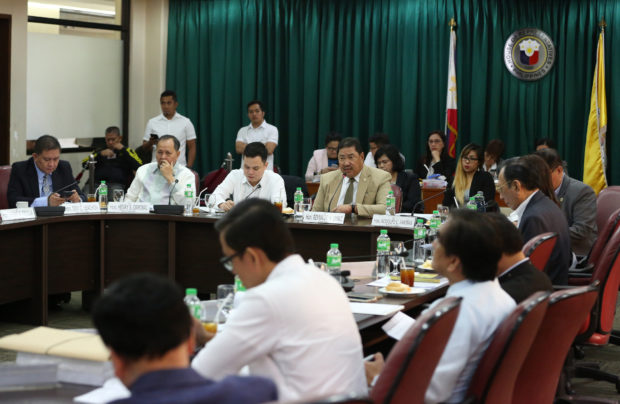
IMPEACHMENT HEARING Rep. Reynaldo Umali, chair of the House committee on justice, leads the continuation of the hearing on the impeachment complaint against Chief Justice Maria Lourdes Sereno. —NIÑO JESUS ORBETA
Senate Minority Leader Franklin Drilon and Sen. Francis Escudero on Monday said lawmakers neither had the power to issue a subpoena nor order the arrest of Chief Justice Maria Lourdes Sereno in an impeachment hearing.
Drilon, a lawyer, former secretary of justice and former Senate President, warned that imprudent exercise of these powers may trigger a serious constitutional crisis.
Escudero, also a lawyer, issued a similar warning.
Oriental Mindoro Rep. Reynaldo Umali, head of the House justice committee, said in a radio interview on Sunday that the panel was studying if it could subpoena Sereno to answer the allegations in the impeachment complaint against her, as the Chief Justice had repeatedly refused to face her accuser, insisting instead on representation by counsel.
Umali said the committee would exercise its power to order Sereno’s arrest if the Chief Justice refused to honor the subpoena.
Drilon told reporters on Monday that the power of Congress to issue a subpoena and order the detention of a witness who refused to obey the summons were available only in investigations in aid of legislation, not in impeachment proceedings.
A subpoena, in effect, will compel Sereno in an impeachment complaint to testify against herself, Drilon said.
Forcing Sereno to attend and testify against herself in an impeachment hearing cannot be done without triggering a constitutional crisis, he said.
“When the House of Representatives conducts a hearing on an impeachment complaint, the hearing is not in aid of legislation. The Chief Justice is not being asked to testify as a resource person who can be subpoenaed to assist the [House] discharge its legislative function,” Drilon said.
He urged Umali to “exercise extreme caution” in using the coercive powers of Congress to issue a subpoena to Sereno, as there is no basis for it and it will only provoke a needless constitutional crisis.
“Requiring her to testify against herself would place her under the strongest temptation to commit perjury, and subject her to an extortion of confession by duress,” Drilon said, adding that issuing summons would violate Sereno’s constitutional rights and the principle of separation of powers.
Constitutional crisis
Senator Escudero said respondents in impeachment cases could not be compelled to give evidence against themselves.
He said the refusal of Sereno to attend the impeachment proceedings if summoned “may result in a constitutional crisis if the Chief Justice refuses to attend.”
“[I]f I remember correctly, the attendance or participation of the respondent in an impeachment case, or in any case for that matter, cannot be compelled. [He cannot be forced] to give evidence against himself or herself even if he or she attends,” Escudero said.
The House justice committee went into executive session briefly on Monday to discuss whether the panel had the right to compel Sereno to come to the impeachment proceedings.
When the committee members returned for the public hearing, Umali did not raise the matter of Sereno’s possible arrest but stressed the “extraordinary constitutional powers” wielded by the impeachment panel.
Umali noted that only the justice committee, as an impeachment panel, was mandated by the 1987 Constitution “to give attention to the very important process of checks and balances.”
He added that impeachment proceedings “take precedence over other all legislative processes.”
Umali said Sereno was only one of the Supreme Court’s 15 members, and thus did not hold the powers of the entire judiciary.
“This is precisely why some of the members are complaining. One of the allegations is there is usurpation or arrogation of power of one supreme body in one person,” he said.
Speaking to reporters before the executive session, Umali clarified that his bringing up the possibility of Sereno’s arrest was only “hypothetical” and under the assumption that she would ignore an official summons from the panel.
“I was just speaking my mind because I firmly believe the extraordinary power given to the committee on justice as an impeachment committee is a constitutional mandate that ought to be followed by everyone,” he said.
Sereno, he said, is not an ordinary accused in a criminal case, and thus does not enjoy the rights of such an accused.
“She is a respondent … This is more akin to an administrative case,” he said.
Contempt threats
The justice committee also threatened to cite for contempt two spokespersons for Sereno for describing the impeachment proceedings a “dog and pony show.”
The committee issued an order directing lawyers Joshua Santiago and Aldwin Salumbides to explain within 72 hours why they should not be cited for contempt for making the statement last week.
The panel issued a similar order for Human Rights Commissioner Roberto Cadiz, who was quoted in a news report as saying last week that the “law of the jungle” seemed to be prevailing in the impeachment case against Sereno.
Another spokesperson for Sereno, Jojo Lacanilao, defended his two colleagues, saying their remarks were not directed at the committee but at the complainant, lawyer Lorenzo Gadon.
“If they were offended, we apologize for any offense. That was not intended for any personality, but to the evidence that was brought out and the allegations, which were unproven,” Lacanilao said.